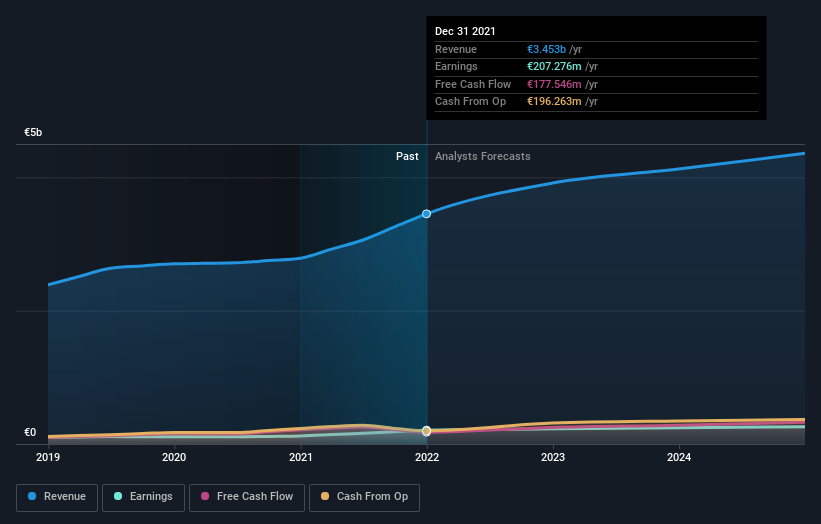- Netherlands
- /
- Trade Distributors
- /
- ENXTAM:IMCD
With 72% ownership, IMCD N.V. (AMS:IMCD) boasts of strong institutional backing

To get a sense of who is truly in control of IMCD N.V. (AMS:IMCD), it is important to understand the ownership structure of the business. And the group that holds the biggest piece of the pie are institutions with 72% ownership. Put another way, the group faces the maximum upside potential (or downside risk).
Because institutional owners have a huge pool of resources and liquidity, their investing decisions tend to carry a great deal of weight, especially with individual investors. Therefore, a good portion of institutional money invested in the company is usually a huge vote of confidence on its future.
Let's delve deeper into each type of owner of IMCD, beginning with the chart below.
See our latest analysis for IMCD

What Does The Institutional Ownership Tell Us About IMCD?
Many institutions measure their performance against an index that approximates the local market. So they usually pay more attention to companies that are included in major indices.
IMCD already has institutions on the share registry. Indeed, they own a respectable stake in the company. This suggests some credibility amongst professional investors. But we can't rely on that fact alone since institutions make bad investments sometimes, just like everyone does. If multiple institutions change their view on a stock at the same time, you could see the share price drop fast. It's therefore worth looking at IMCD's earnings history below. Of course, the future is what really matters.

Since institutional investors own more than half the issued stock, the board will likely have to pay attention to their preferences. We note that hedge funds don't have a meaningful investment in IMCD. Looking at our data, we can see that the largest shareholder is Capital Research and Management Company with 15% of shares outstanding. Meanwhile, the second and third largest shareholders, hold 8.5% and 5.1%, of the shares outstanding, respectively. Additionally, the company's CEO Pieter C. van der Slikke directly holds 1.6% of the total shares outstanding.
After doing some more digging, we found that the top 11 have the combined ownership of 50% in the company, suggesting that no single shareholder has significant control over the company.
Researching institutional ownership is a good way to gauge and filter a stock's expected performance. The same can be achieved by studying analyst sentiments. There are plenty of analysts covering the stock, so it might be worth seeing what they are forecasting, too.
Insider Ownership Of IMCD
The definition of an insider can differ slightly between different countries, but members of the board of directors always count. The company management answer to the board and the latter should represent the interests of shareholders. Notably, sometimes top-level managers are on the board themselves.
I generally consider insider ownership to be a good thing. However, on some occasions it makes it more difficult for other shareholders to hold the board accountable for decisions.
We can see that insiders own shares in IMCD N.V.. Insiders own €146m worth of shares (at current prices). we sometimes take an interest in whether they have been buying or selling.
General Public Ownership
The general public, who are usually individual investors, hold a 26% stake in IMCD. This size of ownership, while considerable, may not be enough to change company policy if the decision is not in sync with other large shareholders.
Next Steps:
It's always worth thinking about the different groups who own shares in a company. But to understand IMCD better, we need to consider many other factors. To that end, you should learn about the 2 warning signs we've spotted with IMCD (including 1 which is concerning) .
If you would prefer discover what analysts are predicting in terms of future growth, do not miss this free report on analyst forecasts.
NB: Figures in this article are calculated using data from the last twelve months, which refer to the 12-month period ending on the last date of the month the financial statement is dated. This may not be consistent with full year annual report figures.
New: AI Stock Screener & Alerts
Our new AI Stock Screener scans the market every day to uncover opportunities.
• Dividend Powerhouses (3%+ Yield)
• Undervalued Small Caps with Insider Buying
• High growth Tech and AI Companies
Or build your own from over 50 metrics.
Have feedback on this article? Concerned about the content? Get in touch with us directly. Alternatively, email editorial-team (at) simplywallst.com.
This article by Simply Wall St is general in nature. We provide commentary based on historical data and analyst forecasts only using an unbiased methodology and our articles are not intended to be financial advice. It does not constitute a recommendation to buy or sell any stock, and does not take account of your objectives, or your financial situation. We aim to bring you long-term focused analysis driven by fundamental data. Note that our analysis may not factor in the latest price-sensitive company announcements or qualitative material. Simply Wall St has no position in any stocks mentioned.
About ENXTAM:IMCD
IMCD
Distributes, markets, and sells specialty chemicals and ingredients in the Netherlands, rest of Europe, the Middle East, Africa, North America, South America, and the Asia-Pacific.
Adequate balance sheet average dividend payer.
Similar Companies
Market Insights
Community Narratives



